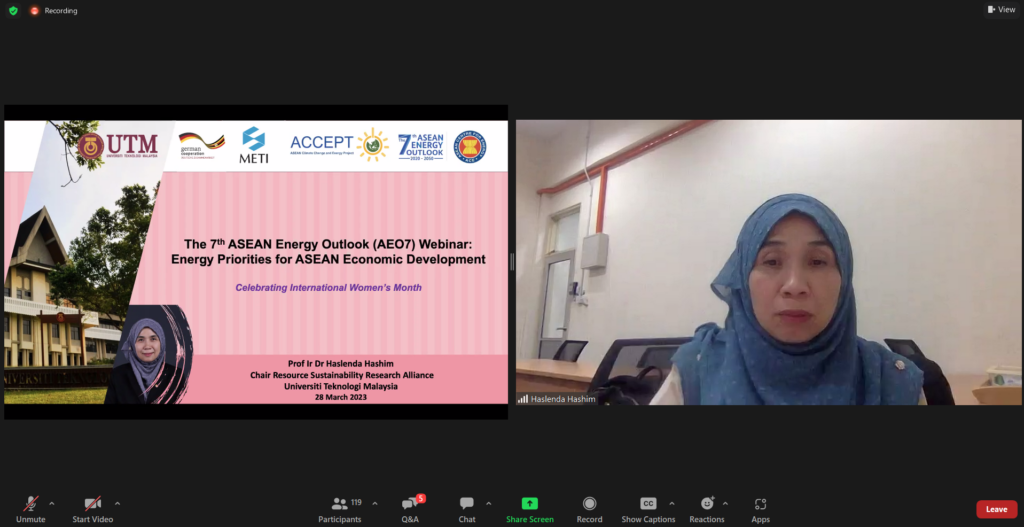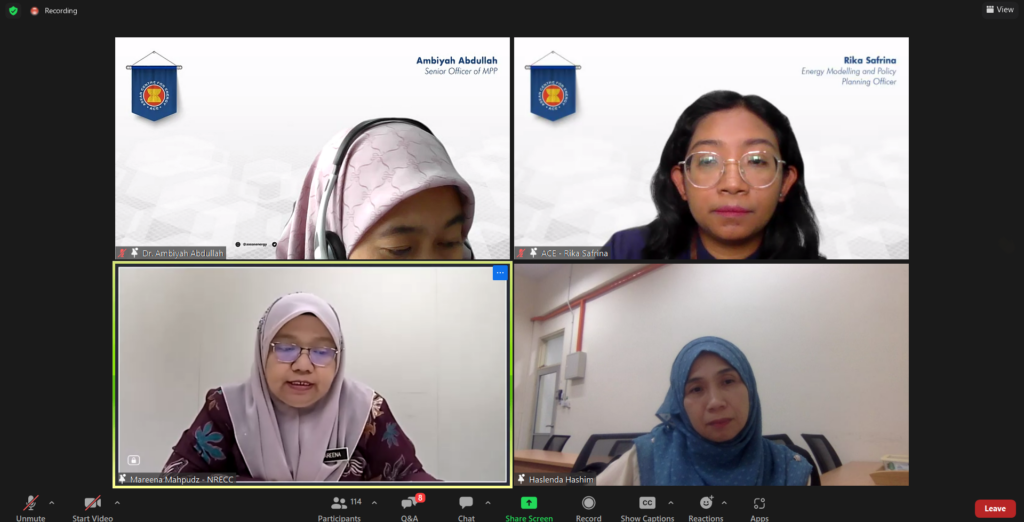Menu
On 28 March 2023, the ASEAN Centre for Energy (ACE) hosted the 3rd series of the 7th ASEAN Energy Outlook (AEO7) webinar, taking the special theme “Energy Priorities for ASEAN Economic Development”. The objective of the event was to discuss the AEO7 findings, the projection of the ASEAN Plan of Action for Energy Cooperation (APAEC) Phase II achievements, the priorities under Indonesia’s ASEAN Chairmanship 2023, and the role of women in the ASEAN energy development by welcoming mostly female panellists in celebrating International Women’s Day.
The webinar began with showcasing the AEO7 video introduction and a quiz to get a better understanding and engage participants by Ms. Amira Bilqis, Energy Modelling and Policy Planning (MPP) Associate at ACE. It was then followed by a scene-setting presentation by Ms. Rika Safrina, MPP Officer at ACE, on “Foreseeing the Achievements of ASEAN Energy Targets”. During her session, Ms. Safrina delved into the trends of ASEAN energy demand and supply across different scenarios in the AEO7. She also explains the progress and projections of the aspirational regional target set in the APAEC, including 32% energy intensity reduction based on the 2005 level, 23% renewable energy (RE) share in total primary energy supply, and 35% RE share in installed power capacity. She emphasised the need to make adjustments to meet the goals, and outlined potential efforts that can be taken to achieve them through both the demand and supply sides. The presentation concluded with policy recommendations on how the region should navigate a secure and resilient energy transition.
 The panel session was moderated by Dr. Ambiyah Abdullah, MPP Senior Officer at ACE, and the invited panellists were Madam Mareena Mahpudz (Senior Undersecretary Electricity Supply, Ministry of Natural Resources, Environment, and Climate Change of Malaysia), Ms. Andriah Feby Misna Mr. Praptono Adhi Sulistomo (Coordinator of New and Renewable Energy Investment and Cooperation, Directorate General of Renewable Energy and Energy Conservation, Ministry of Energy and Mineral Resources of Indonesia), Prof. Ir. Dr. Haslenda Hashim (Chair of Resources Sustainability, Universiti Teknologi Malaysia), and Ms. Rika. Safrina (Energy Modelling and Policy Planning Officer at ACE).
The panel session was moderated by Dr. Ambiyah Abdullah, MPP Senior Officer at ACE, and the invited panellists were Madam Mareena Mahpudz (Senior Undersecretary Electricity Supply, Ministry of Natural Resources, Environment, and Climate Change of Malaysia), Ms. Andriah Feby Misna Mr. Praptono Adhi Sulistomo (Coordinator of New and Renewable Energy Investment and Cooperation, Directorate General of Renewable Energy and Energy Conservation, Ministry of Energy and Mineral Resources of Indonesia), Prof. Ir. Dr. Haslenda Hashim (Chair of Resources Sustainability, Universiti Teknologi Malaysia), and Ms. Rika. Safrina (Energy Modelling and Policy Planning Officer at ACE).
The session commenced with a thought-provoking presentation by Madam Mahpudz, who elaborated on the critical planning criteria and policies concerning energy security, equity, and environmental sustainability. She noted that Malaysia still heavily relied on fossil fuels and expounded on the assumptions made in developing the generation plan for electricity supply in peninsular Malaysia.
The session then progressed with a presentation from Mr. Praptono Adhi Sulistomo (Coordinator of New and Renewable Energy Investment and Cooperation, Directorate General of Renewable Energy and Energy Conservation, Ministry of Energy and Mineral Resources of Indonesia), representing Ms. Andriah Feby Misna, who highlighted Indonesia’s green and sustainable energy development targets. These targets include a 2025 goal of 23% new and renewable energy (NRE) in the national primary energy mix, 2030 targets for Nationally Determined Contribution, and a 2060 net-zero emissions target. Mr. Sulistomo also shared insights into Indonesia’s NRE potential and development strategies, emphasising the need for robust NRE policies to create a sustainable and equitable climate for NRE development.
Prof. Haslenda then presented on ASEAN Energy Cooperation & Connectivity Goals, emphasising the significance of cooperation and connectivity goals in energy and sustainability, clean coal technologies, energy efficiency and conservation, renewable energy, regional energy policy and planning, and civilian nuclear energy. She highlighted the potential for blending hydrogen and natural gas energy sources as a significant future development and underlined the importance of policy planning to accelerate the energy transition.
The session proceeded with an engaging Q&A session, inviting all the esteemed panellists to share their insightful perspectives. The stimulating discussion centred around crucial topics such as ASEAN leaders’ current policies and directives, including Malaysia, as 2023 marks the midpoint of the APAEC Phase II. Additionally, the role of women in achieving the energy-related goals of APAEC was discussed, focusing on how their participation can be further enhanced.
The view of academia was also sought, with a query on the technologies, strategies, or measures that should be prioritised to support ASEAN energy cooperation and connectivity goals. The importance of gender mainstreaming in sustainable energy development was highlighted, and the role of women in the ASEAN energy sector was discussed at length.
The discussion further delved into the findings and recommendations of AEO7 and the next steps needed to complete APAEC Phase I & II. The insightful panellists shared their perspectives on how AEO7 can be an essential tool for APAEC. In addition, this event also provided profound and cohesive insights into the trends in energy supply and consumption at the regional and national levels.



The webinar also highlighted the importance of gender mainstreaming in every policymaking process. The inclusion of women in the energy sector offers the potential for communities to strengthen resilience while promoting economic empowerment. The discussions during the webinar hopefully helped to widen public knowledge on how the region can achieve energy security, accessibility, affordability, and sustainability for all.
(JK, AB)
